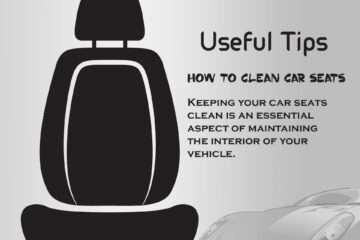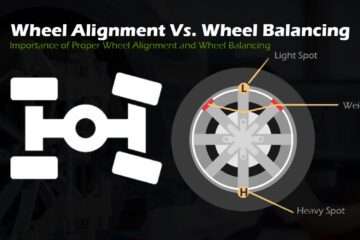Squeaky brakes can transform a peaceful drive into a stress-inducing journey, not to mention the concern they bring regarding your vehicle’s safety and functionality. Understanding what causes squeaky brakes and how to fix squeaky brakes is crucial for maintaining your vehicle in top condition and ensuring a smooth, quiet ride. Squeaky brakes can be more than just an annoyance; they could signal underlying issues that need immediate attention. Therefore, identifying and addressing the root cause of squeaky brakes is essential for both your peace of mind and safety on the road.
This article delves into recognizing different types of brake noises, providing you with top solutions for each noise type, including how to stop squeaky brakes. From a squeaky brake pedal to the complexities of what causes squeaky brakes, we’ll guide you through step-by-step brake noise fixes. Moreover, you’ll discover prevention tips for quiet brakes, helping you to maintain them in a condition that prevents the annoyance and danger of squeaky brakes. By the end of this guide, you’ll be equipped with the knowledge and tools needed for a squeaky brakes fix, ensuring you can drive comfortably and confidently once more.
Tire Speed Ratings: Unraveling the Mystery
When it comes to choosing the right tires for your vehicle, one crucial factor to consider is the Tire Speed […]
Recognizing the Types of Brake Noises
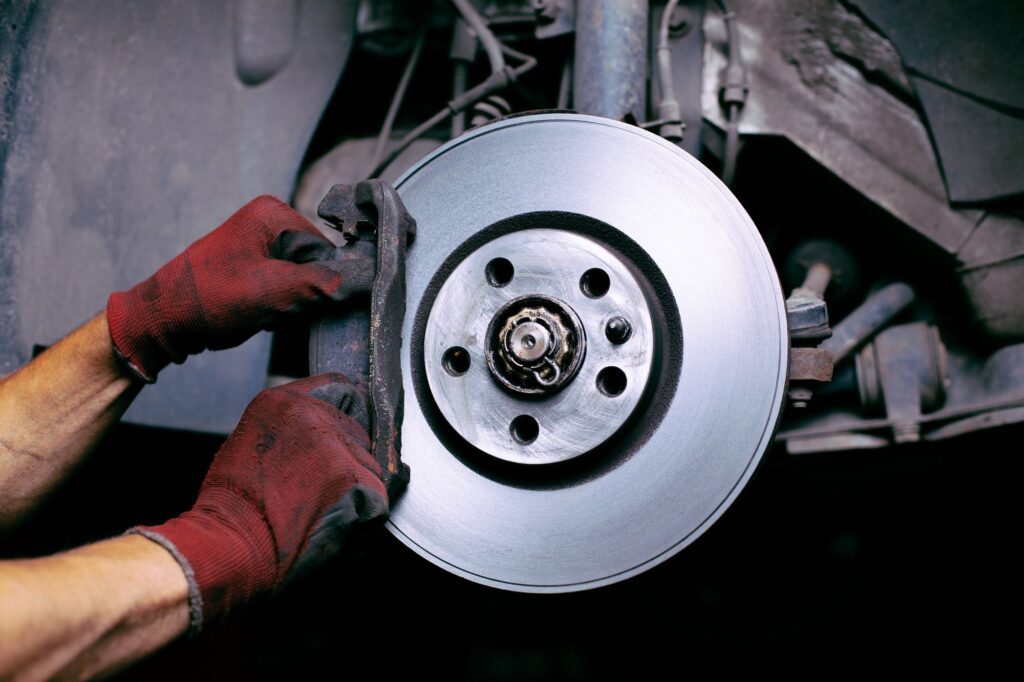
Brake noises can be an indicator of various issues within your vehicle’s braking system. To effectively address squeaky brakes and be able to know what causes squeaky brakes and how to stop squeaky brakes, it’s crucial to identify the specific type of noise you’re experiencing. Here are the common brake noises you may encounter:
Squealing Noises
A high-pitched squealing or screeching sound often indicates that your brake pads are worn down. As the squeaky brake pedal wear thin, a metal wear indicator rubs against the rotor, creating this piercing noise. Visually inspect your squeaky brake pedal and measure their thickness. If they are excessively thin or worn down, it’s time to replace them.
Grinding Noises
A low-pitched grinding or growling noise typically signifies metal-on-metal contact within the brake system. This can occur when the brake pads have completely worn out, and the metal backing plate is grinding against the rotor. Inspect your rotors for heavy grooving or excessive wear. If the rotors are heavily scored, you’ll likely need to replace both the pads and rotors.
Screeching Sounds
A screeching or high-pitched squeal can sometimes be caused by a foreign object, such as a pebble or sand, lodged between the brake pad and rotor. In some cases, it may also indicate that the brake pad wear indicators are exposed, signaling the need for new brake pads to be able to know what causes squeaky brakes. If the noise persists after applying the brakes, it’s advisable to have your brakes inspected by a professional.
Recognizing the specific type of brake noise of squeaky brakes can help you identify the underlying issue and take appropriate action and know how to stop squeaky brakes. Addressing brake noises promptly is crucial for maintaining your vehicle’s safety and preventing further damage to the braking system.
Starfire Solarus AS All-Season Tires Clear Reviews
The Starfire Solarus AS All-Season Tires have garnered widespread acclaim from users who are not only impressed by their exceptional […]
Top Solutions for Each Noise Type

Simple fixes for squealing noises
If you hear a high-pitched squealing or screeching sound when applying the brakes, it’s likely caused by worn squeaky brake pedal. As the pads wear down, a metal wear indicator rubs against the rotor, creating this piercing noise. Here are some solutions you can try:
- Inspect the brake pads and measure their thickness. If they are excessively thin or worn down, it’s time to replace them.
- Check for any debris or foreign objects lodged between the brake pad and rotor. Remove any obstructions that may be causing the squeal.
- Lubricate the caliper pins and slides with a high-quality brake lubricant. Improper lubrication can cause the pads to stick, leading to squealing.
- If the noise persists after applying the brakes, have your brakes inspected by a professional to know what causes squeaky brakes. The rotor surface may be compromised, or the brake pad wear indicators may be exposed, requiring replacement.
When to address grinding noises
A low-pitched grinding or growling noise typically signifies metal-on-metal contact within the brake system. This can occur when the brake pads have completely worn out, and the metal backing plate is grinding against the rotor. If you hear this noise, it’s crucial to take immediate action to how to stop squeaky brakes:
- Inspect your rotors for heavy grooving or excessive wear. If the rotors are heavily scored, you’ll likely need to replace both the pads and rotors.
- Check the brake pads for excessive wear. If they are worn down to the metal backing plate, replace them immediately.
- Avoid driving your vehicle if possible until the brakes are repaired. Continuing to drive with grinding brakes can cause further damage to the rotors and compromise your safety.
- How to fix squeaky brakes? Have your brakes inspected and repaired by a professional mechanic as soon as possible. Ignoring grinding noises can lead to costly repairs and potential brake failure.
Handling screeching sounds
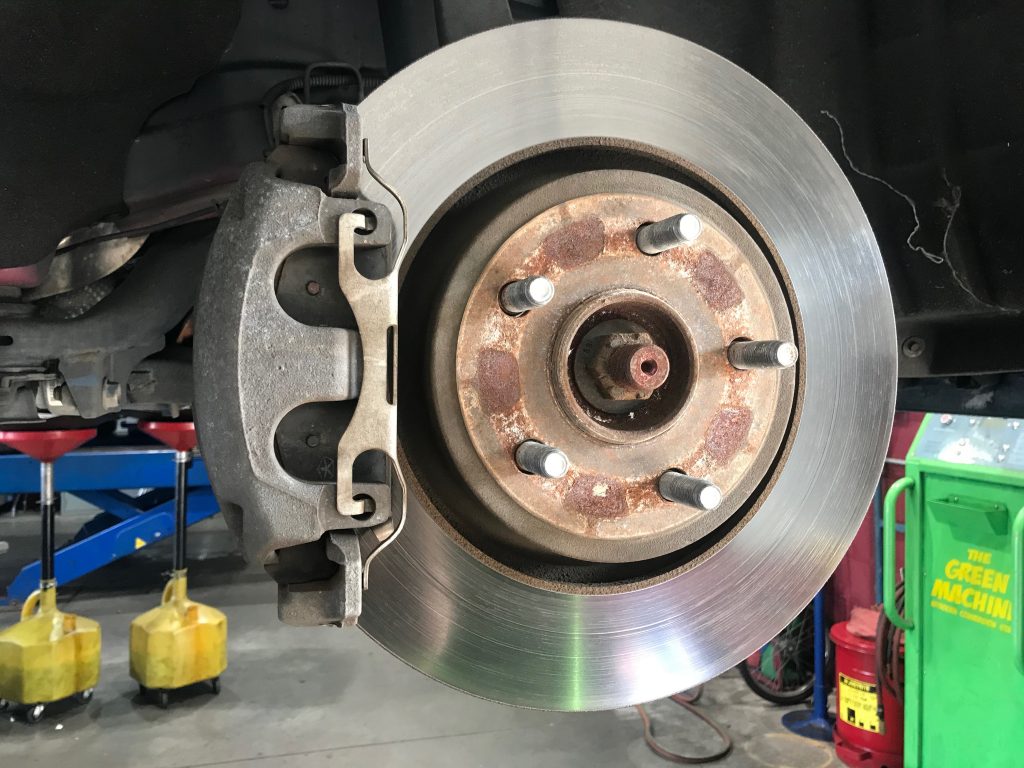
A screeching or high-pitched squeal can sometimes be caused by a foreign object, such as a pebble or sand, lodged between the brake pad and rotor. It may also indicate that the brake pad wear indicators are exposed, signaling the need for new brake pads of squeaky brakes. Here’s what you can do:
- Check for any debris or foreign objects stuck between the brake pad and rotor. Remove any obstructions that may be causing the screech.
- If the noise persists after applying the brakes, have your brakes inspected by a professional. The brake pads may need to be replaced if the wear indicators are exposed.
- In some cases, the screeching sound may be caused by improper lubrication or worn-out caliper pins. Have a mechanic inspect and lubricate the caliper components if necessary.
Addressing brake noises promptly of squeaky brakes is crucial for maintaining your vehicle’s safety and preventing further damage to the braking system. By following these solutions for each noise type, you can ensure a quieter, smoother ride and extend the lifespan of your brakes and get experience of how to fix squeaky brakes.
Top 7 Tires for Toyota Camry of 2024: Expert Reviews & Picks
Selecting the right tires for your Toyota Camry can significantly impact your driving experience, fuel efficiency, and safety. Especially if […]
Step-by-Step Brake Noise Fixes
Step 1: Inspect and Diagnose
The first step in addressing squeaky brakes is to inspect and diagnose the issue and know what causes squeaky brakes. Begin by listening carefully to the type of noise your brakes are making. A high-pitched squeal typically indicates worn brake pads, while a grinding or growling noise suggests metal-on-metal contact, which is a more severe issue.
- Park your vehicle on a level surface and apply the parking brake.
- With the engine running, gently depress the brake pedal and listen for any unusual noises.
- Inspect the brake pads by looking through the wheel spokes or by removing the wheels if necessary.
- Check the thickness of the brake pads and look for any visible wear indicators.
- Examine the brake rotors for excessive grooves, scoring, or warping.
- If you notice any debris or foreign objects lodged between the brake pad and rotor, remove them carefully.
Proper diagnosis is crucial to determine what causes squeaky brakes and the appropriate course of action of how to stop squeaky brakes.
Step 2: Clean and Lubricate
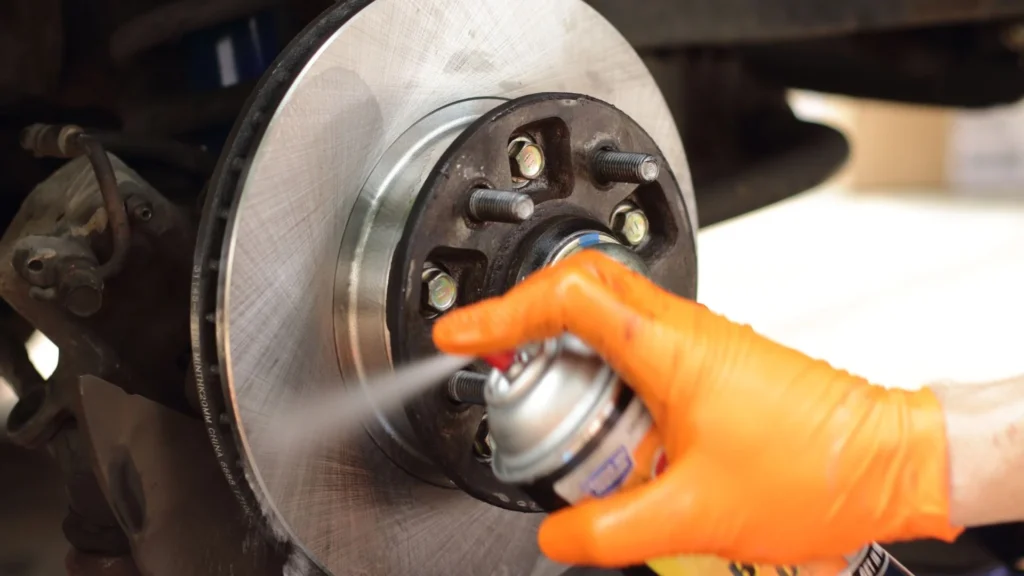
If the brake pads and rotors are in good condition, and the noise is caused by a buildup of debris or rust, you can try cleaning and lubricating the brake components.
- Remove the brake pads and caliper assembly according to your vehicle’s service manual.
- Use a brake cleaner or degreaser to remove any dirt, debris, or rust buildup from the brake pads, rotors, and caliper assembly.
- Once clean, apply a high-quality brake lubricant to the caliper pins, slides, and any other moving parts of the caliper assembly.
- Lubricate the back of the brake pads with a thin layer of brake lubricant to prevent noise caused by vibration.
- Reassemble the brake components, ensuring proper alignment and torque specifications.
Proper lubrication can help reduce friction and prevent squeaking or grinding noises of squeaky brakes caused by dry or stuck components.
Step 3: Replace if Necessary
If the squeaky brake pedal are worn beyond the minimum thickness specified by the manufacturer, or if the rotors are excessively grooved or warped, it’s time to replace them.
- Follow the manufacturer’s instructions to remove the brake pads, rotors, and any other necessary components.
- Install new brake pads and rotors, ensuring they are compatible with your vehicle’s make and model.
- If replacing the rotors, it’s recommended to replace them in pairs (both front or both rear) to maintain even braking performance.
- Inspect and replace any other worn or damaged components, such as brake calipers or hardware, as needed.
- After installation, follow the brake bedding-in procedure recommended by the manufacturer to ensure proper break-in of the new components.
Replacing worn or squeaky brakes components is essential for maintaining proper braking performance and preventing further damage to the braking system. You must know how to fix squeaky brakes?.
By following these step-by-step brake noise fixes and how to fix squeaky brakes, you can effectively diagnose and address the root cause of squeaky brakes, ensuring a quieter and safer driving experience.
Prevention Tips for Quiet Brakes
Maintaining your vehicle’s brakes in optimal condition is crucial for ensuring a quiet and smooth driving experience by knowing how to stop squeaky brakes. Here are some prevention tips to help you achieve quiet brakes:
Regular brake inspections

Regular brake inspections offer numerous benefits, including:
- Safety: The most obvious advantage is safety. Effective braking capability is crucial to prevent accidents, especially in emergency situations.
- Cost Savings: Catching issues early can mean cheaper repairs. Worn pads are much cheaper to replace than worn pads and damaged rotors.
- Vehicle Longevity: Maintaining your brake system can help extend the life of your vehicle.
- Peace of Mind: Knowing your brakes are in good condition can give you confidence and peace of mind while driving.
During a squeaky brakes inspection, technicians typically check:
- Brake Pad Thickness: Checking for wear and measuring the remaining service life of the pads.
- Rotor Condition: Looking for warping or damage.
- Brake Fluid: Checking the level and quality of the brake fluid.
- Brake Lines and Hoses: Inspecting for leaks or any signs of wear.
- Brake Lights: Ensuring that your brake lights function correctly to alert other drivers when you are stopping.
Regular inspections can help reduce brake noise and keep your car running quietly and smoothly by know what causes squeaky brakes. If your brakes make unusual noises, it could indicate worn brake pads or rotors. Catching these issues early on can prevent them from becoming more serious and expensive.
Low Rolling Resistance Tires and Fuel Efficient Tires, Know It All
In the pursuit of better fuel economy and reduced environmental impact, Low Rolling Resistance Tires and best fuel efficient tires […]
Using high-quality brake components
Choosing high-quality brake pads specifically designed for your vehicle, such as Original Equipment (OE) quality pads, can significantly reduce the chances of brake noise of squeaky brakes. These pads are engineered to meet the specifications of your vehicle and provide optimal performance and noise reduction. Avoid using low-quality or generic brake pads that may not fit or perform as well.
Proper installation of brake pads is also vital for noise prevention. Make sure the pads are positioned correctly and that all necessary hardware, such as shims and clips, are in place. Consult your vehicle’s manual or seek professional assistance to ensure proper installation and how to stop squeaky brakes.
By prioritizing regular squeaky brakes inspections and using high-quality brake components, you can minimize the likelihood of annoying squeaky brakes and enjoy a quieter, more comfortable driving experience.
Conclusion
Throughout this guide, we’ve explored the common culprits behind squeaky brakes and offered solutions to address each issue of what causes squeaky brakes, emphasizing the importance of regular maintenance and the use of high-quality brake components. Whether you’re facing a screeching high-pitch noise due to worn squeaky brake pedal or a grinding sound from metal-on-metal contact, the steps provided aim to not only solve these problems but also to prevent them from recurring. By attentively diagnosing the type of brake noise and following the outlined fixes by know how to stop squeaky brakes, vehicle owners can restore the tranquility of their drives and ensure their safety on the road.
Moreover, the guide highlights the significance of regular brake inspections and proper installation practices, underscoring how preventive measures can extend the lifespan of your braking system and contribute to a smoother ride. In a broader context, understanding and implementing the discussed solutions and tips signify a step towards responsible vehicle maintenance. As we conclude, remember that addressing squeaky brakes is not just about eliminating noise but about safeguarding your vehicle’s functionality and your safety.
FAQs
Q: Why do my new brake pads squeak even after I’ve changed them?
A: New brake pads often squeak due to excess vibration when they first make contact with the brake rotors. This is normal in the early stages of use. To reduce the squeaking of squeaky brakes, continue driving and avoid abrupt braking to allow the pads to wear in properly.
Q: Will my brakes stop squeaking over time?
A: Yes, brake pads typically stop squeaking after they have been used enough to remove any surface rust or residue. If the weather has been dry, the squeaking may decrease as well. Generally, after driving a few hundred miles, the squeaking should significantly reduce or stop. how to stop squeaky brakes
Q: Can I use WD-40 to stop my brakes from squeaking?
A: It is not advisable to use WD-40 on squeaky brakes. While WD-40 is effective for other mechanical squeaks, it’s best to avoid using it on car brakes.
Q: How can I eliminate squeaking from disk brakes?
A: To stop disk brakes from squeaking, thoroughly clean the disc rotor and brake caliper, and consider replacing the brake pads. If the pads still have sufficient material, you can try removing contaminants with a blow torch or lightly sanding the pads.


